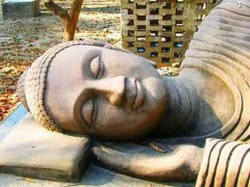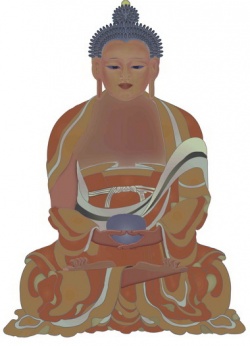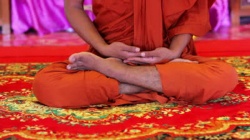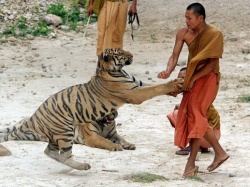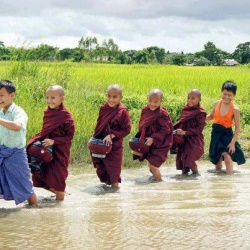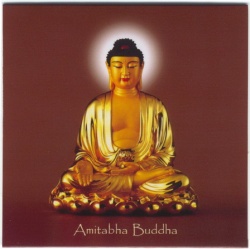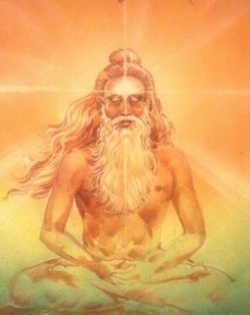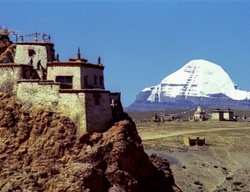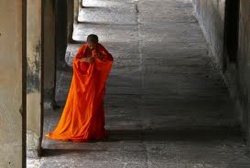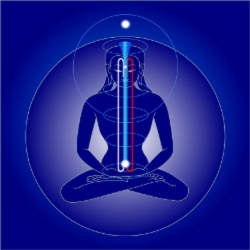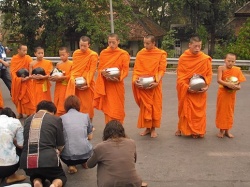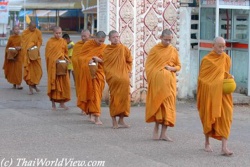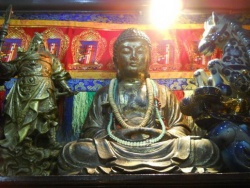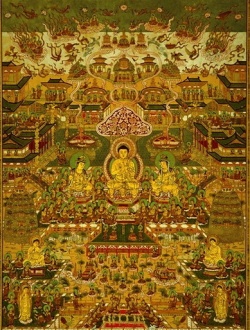Mahayana Mahaparinirvana Sutra: Chapter 18: On Actual Illness
Mahayana Mahaparinirvana Sutra
Chapter 18: On Actual Illness
Translated by Kosho Yamamoto from Dharmakshema's Chinese version,
edited and revised by Dr. Tony Page
Copyright for this edition is held by Dr. Tony Page, 2012.
Then, Kasyapa said to the Buddha: "O World-Honoured One! The Tathagata is already far removed from all illness. Defilement and pain already done away with, no fear remains behind. O World-Honoured One! All beings have four poisonous arrows, which become the cause of illness. What are the four? They are greed, ill-will, ignorance and arrogance. When the cause is within, illnesses arise, such as cold, fever, comsumption, dizziness, vomiting, paralysis of the body, madding mind, loose bowels, convulsions, loose urine (weak bladder), pain in the eyes and ears, swollen abdomen and back, craziness, dryings-up, or being tormented by evil spirits. All such bodily ills cannot arise in the All-Buddha-World-Honoured One. Why is it that the Tathagata looks back and says to Manjushri: "I have pain in my back. All of you should teach the great congregation"? Illnesses arise for two reasons. What are the two? First, it is having pity on all beings; second, it is giving medicine to those who are ill. The Tathagata, already an innumerable million billion kalpas ago, when the Tathagata was practising the Way of a Bodhisattva, always had words of love. He benefited beings and extracted the root of worry. He gave various medicines to all who were ill. Why is it that today, now, he should have an illness? O World-Honoured One! What applies in the world is that a sick person sits or reclines and has no time to rest. He calls for food, gives injunctions to his family, or tells them to work. Why is it that the Tathagata sits silently? Why is it that you do not teach your disciples and sravakas the right practices of shilaparamita and dhyanaparamita? Why is it that you do not deliver Mahayana sutras that have deep meaning? Why is it that, using innumerable expedients, you do not teach Mahakasyapa, the great elephant among men, and the great persons, so that they will not retrogress from unsurpassed Enlightenment? Why is it that you do not teach all evil-doing bhiksus who receive and store up impure things? O World-Honoured One! You have no illness. Why do you recline on your right side? All Bodhisattvas give medicines to patients and whatever merits arise from giving are all bestowed upon all beings and transferred to All-Knowledge. This is to extract the hindrances of defilement, the hindrances of karma, and those of karmic results. The hindrances of defilement are greed, hatred, ignorance, and anger at what is disagreeable, illusion that overshadows the mind, hindering thereby good from shooting out its buds; (the hindrances are also) burning worry, jealousy, stinginess, cheating, flattery, not feeling ashamed of one's own self, not feeling ashamed of others, pride, pride-pride, simulative pride, pride of self-conceit, pride of self, twisted pride, arrogance, indolence, self-importance, mutual resentment, arguing, wrong living, flattering, cheating using different appearances, pursuing profit by profit, seeking things through wrong channels, seeking a lot, lacking respect, not observing the injunctions, and associating with bad friends. There is no end of seeking profit, to entwine and bind one's own self so that all is difficult to understand. A person abides in evil desires and evil greed. A person is greedily intent upon heretical views of life regarding his carnal existence, the "is" and the "not-is" views of life; a person heaves a groan or is pleased to drowse, lets out a yawn or is not pleased, or eats greedily; his mind is dim and he thinks of strange things, does evil with body and in speech, finds pleasure in talking overmuch; all his sense-organs are dark; he talks excessively and is always overshadowed by such senses as greed, anger and harming. These are the hindrances of defilement.
"The hindrances (which arise) from deeds (karma) are the five deadly sins and the diseases of serious evil.
"The hindrances from karmic retribution give one life in the realms of hell, animals, and hungry pretas, and also the slandering of Wonderful Dharma, and the icchantika. These are the hindrances from retribution.
"These three hindrances are the evils. Yet, the Bodhisattva, when practising the Way over innumerable kalpas, dispensed medicines for all illnesses and always vowed to release beings eternally from the grave illnesses of the three hindrances.
"Also, next, O World-Honoured One! When the Bodhisattva-mahasattva practised the Way, he gave medicine to all who were sick and always took the vows: "Let beings be eternally segregated from all ills and let them attain the Adamantine Body of the Tathagata. Also, let all the innumerable beings become all-wonderful medicines and be able to cut off evil illnesses; let all beings gain the agada and, by the power of this medicine, do away with all the innumerable evil poisons; let not all beings retrogress from unsurpassed Enlightenment, but let them swiftly accomplish the unsurpassed Buddha-medicine and extract all the poisonous arrows; let all beings make effort, generate and accomplish the Adamantine Mind of the Tathagata, becoming this all-wonderful medicine, cure all diseases, so that no disputatious mind can arise; let beings become a great tree of medicine and cure all serious illnesses of all beings; let one thoroughly extract the poisoned arrows of beings and accomplish the unsurpassed light of the Tathagata; let beings enter the Tathagata's hidden store of the Dharma of Wisdom's great medicine and the close-guarded store of Dharma." O World-Honoured One! The Bodhisattva, already innumerable hundred thousand nayutas of kalpas ago, took these vows and extracted all the ills from all beings. Why is it that the Tathagata today says that he has illness?
"Also, next, O World-Honoured One! There is in the world a person who is ill in bed, who cannot sit, get up, look up, walk or stand, and is not able to swallow any food or make liquid pass down his throat; he cannot teach and admonish his sons so that they can learn household work. His parents, wife, children, brothers, relatives and friends are anxious, and they think that he will assuredly die. O World-Honoured One! The same is the case with the Tathagata today. You recline on your right-hand side and say nothing. All the ignorant of this Jambudvipa will think: "The Tathagata, the All-Enlightened One is going to enter Nirvana." Why? They may think that you will cease to exist. But the nature of the Tathagata does not, to the end, enter Nirvana. Why not? The Tathagata is eternal and does not change. For this reason, there can be no saying: "I have pain in my back."
"Also, next, O World-Honoured One! There is a person who is ill in bed and whose physique is broken (weakened); he lies with his face down or on his side, or on his bed. Then, people negatively think that death is not far off. The same is the case with the Tathagata. The 95 tirthikas look down upon, and abide in, the thought of the non-eternal. They will certainly say: "Things (in Buddhism) are not as with our own doctrine, in which we base ourselves on self, nature, man, unmolestedness, time, mote (“prakrti” - primal matter), and think that these are eternal and suffer no change. Shramana Gautama is now subect to change. This merely reveals the law of change." For this reason, O World-Honoured One, you should not be silent and recline on your right-hand side.
Also, next, O World-Honoured One! There is in the world a man ill in bed. The four great elements increase or decrease, so that they do not work and mix well; his body is extremely weakened and emaciated. Because of this, he cannot sit or get up as he wills. So he remains in bed. With the Tathagata, not one of the four elements is out of harmony. You are perfect in your physical power; nothing is weak or diminished. O World-Honoured One! The little strength of ten cows is not equal to that of a big cow; the strength of ten big cows is not equal to that of a blue cow; the strength of ten blue cows is not equal to that of a common elephant; the strength of ten common elephants is not equal to that of a wild elephant; the strength of ten wild elephants is not equal to that of a two-tusked elephant; the strength of ten two-tusked elephants is not equal to that of a four-tusked elephant; the power of ten four-tusked elephants is not equal to that of a white elephant of the Himalayas; the strength of ten white elephants is not equal to that of a fragrant elephant; the strength of ten fragrant elephants is not equal to that of a blue elephant; the strength of ten blue elephants is not equal to that of a yellow elephant; the strength of ten yellow elephants is not equal to a red elephant; the strength of ten red elephants is not equal to a white elephant; the strength of ten white elephants is not equal to that of a mountain elephant; the strength of ten mountain elephants is not equal to an utpala elephant; the strength of ten utpala elephants is not equal to that of a kumuda elephant; the strength of ten kumuda elephants is not equal to that of a pundarika elephant; the strength of ten pundarika elephants is not equal to that of a Malla (wrestler of tremendous strength); the strength of ten Mallas is not equal to that of a Pakkhandin; that of ten Pakkhandins is not equal to that of one eight-armed Narayana; the strength of ten eight-armed Narayanas is not equal to that of one joint (limb) of a Bodhisattva of the ten “bhumis”. With common mortals, the mid-part of the body does not meet together ; with the Mallas, the mid-part and the head meet together; with the Pakkhandins, all the joints of the body meet together; with Narayana, the joints and the head can well hook together; with the Bodhisattvas of the ten “bhumis”, the bones of all joints separate or join together as in the case of a coiling naga (serpent). Thus, the strength of the Bodhisattva is the greatest. When the world came into existence, the vajrasana (diamond throne) was raised up from the vajra (diamond) land and then raised up to the bodhimanda (site of Enlightenment), which appeared under the Bodhi Tree. Having sat down, the mind of the Bodhisattva attained the ten powers. O Tathagata! You should not be like any (normal) little child. No infant, child, ignorant or brainless person can expound things well. For this reason, although you lie with your face down and on one side, no one reproaches you. You, Tathagata, the World-Honoured One, have great Wisdom and shine over all. You are the naga of men; you possess great virtue and have divine powers; you are the unsurpassed rishi; you have cut away the web of doubt and have extracted the arrow of poison. In peace you go and come, perfect in deportment, and armed with fearlessness. Why should you recline on your right-hand side and cause all heaven and humankind to sink into sorrow and worry?"
Then Kasyapa said in a gatha before the Buddha:
"O Great Holy One of the Gautama clan!
Get up, I pray you, and speak to us about All-Wonderful Dharma!
Do not recline on the bed like some child,
Or one who is sick. The Trainer,
The Teacher of gods and humans,
Lies between the sal trees. The lowly
And the ignorant may say that he will assuredly enter Nirvana.
They know nothing of the vaipulya
Or what the Buddha does.
Like the blind, they do not see
The hidden store of the Tathagata.
Only all the Bodhisattvas and Manjushri well know
The depths, like a good archer.
All Buddhas of the Three Times (past, present and future)
Rest upon Great Compassion.
What is now the worth of such Great Compassion?
With no compassion, the Buddha is no name (no one of any great pre-eminence).
If the Buddha definitely enters Nirvana,
This is not the eternal, O Unsurpassed One!
Take pity on us, answer our prayers, bestow
Benefit upon beings, and subdue all tirthikas!"
Then, the World-Honoured One, his mind of great compassion kindled, realised everything that each being wanted to have, desired to act in accordance (with their wishes), to answer their prayers and bestow benefit, raised himself from his seat, and sat cross-legged. His visage was bright and soft like a molten ball of gold. His serene face and eyes shone like the full moon. His form was pure, without any blemishes. A great light filled the firmament. The light was as bright as that of more than 100 thousand suns. It shone over the east, south, west and north, the four corners, the worlds above and below, and over all the Buddha-lands. It gave beings the torch of Wisdom, illuminated the gloom, and enabled 100 thousand billion nayutas of beings to live in the unretrogressive mind of Bodhi (Enlightenment).
At that time, the Buddha's mind knew of no doubt, and he resembled a lion king. He was adorned with the 32 signs of a great man and the 80 minor marks of excellence. From each pore of his skin there appeared a lotus flower. The flowers were wonderful, each having a thousand petals. The colour was like that of pure gold. The stem was of beryl, the stamens of diamond, and the calyx of turkistan dwarf. It was so big and round that it looked like a great wheel. All these lotus flowers sent out lights of various colours, such as blue, yellow, red, white, purple and crystal. And these lights filled all such hells as Avichi, Samjna, Kalasutra, Sanghata, Raurava, Maharaurava, Tapana, and Mahatapana. In these eight hells, all such afflictions as being burned, boiled, broiled, cut, thrust, having one's skin stripped off, depart. When a person is shone upon by this light, all such afflictions disappear. What there is there is peace, coolness, and unending joy. In this light, the undisclosed store of the Tathagata is proclaimed: "All beings have the Buddha-Nature". The beings hear this, their life ends there and they are born into the worlds of humans and gods. There can further be the eight kinds of hells of coldness, which are: Apapa, Atata, Arbuda, Ababa, Utpala, Kumuda, and Pundarika. The beings who are born there are always pressed upon by cold.What goes on there is puckering and rending of the body, smashing and breaking, mutual harming, all of which, on encountering this light, go away; what then arises there is harmony and warmth, which please the body. This light, too, proclaims the undisclosed store of the Tathagata, saying: "All beings possess the Buddha-Nature." The beings hear this, their life ends, and they get born into the worlds of humans and gods. When this happens, here in this Jambudvipa and in all other worlds, the hells become empty and none do we see there being punished, except for the icchantika. Those of the realms of the hungry ghosts are oppressed by hunger. What they have on to cover their body is hair, and for a period of 100 thousand years they never once hear of liquid. But when they encounter this light, their hunger at once disappears. This light proclaims the undisclosed store of the Tathagata and says: "All beings possess the Buddha-Nature." When all of them hear this, their life ends and they are born into the worlds of humans and gods. The entire realm of hungry ghosts is empty, except for those who slander the Mahayana vaipulya sutras. The beings born in the realm of the animals harm and devour one another. On encountering this light, all hatred departs. The light also proclaims the undisclosed store of the Tathagata and says: "All beings possess the Buddha-Nature." The beings hear this, their life ends, and they are born into the worlds of humans and gods. Then there are no more in the animal realm, except for those who slander Wonderful Dharma.
In each flower, there sits a Buddha. His halo is six feet crosswise, and the golden light shines brightly. It is wonderful and austere. It is unsurpassed and incomparable. The 32 signs of perfection and the 80 minor marks of excellence adorn (each Buddha's) body. Now, of these World-Honoured Ones, some are sitting, some walking, some lying, some standing, and some are emitting the sound of thunder; some are raining down a flood of rain, some are flashing forth lightning, some fanning up a great wind, and others are sending out smoke and flames. Their body resembles a fire-ball. Some show (conjure up the appearance of) mountains, ponds, lakes, rivers, forests and trees, all of gems. Also, they show lands, castle-towns, hamlets, palaces, and houses of gems. Or they show elephants, horses, lions, tigers, wolves, peacocks, Chinese phoenixes, and all such birds. Or all of the people of Jambudvipa are permitted to see the realms of hell, animals and hungry ghosts. Or the six heavens of the world of desire are displayed. Or there may be a World-Honoured One who speaks about all the evils and worries of everything that pertains to the five skandhas, 18 realms and 12 spheres. Or the Dharma of the Four Noble Truths is expounded, or one (Buddha) may speak about causal relations. Another may speak about the Self and the not-Self, or one may be talking about the pair (of opposites), suffering and bliss; or one may be speaking about the Eternal and the non-Eternal. Or another may be speaking about the Pure and the not-Pure. Or there might be a World-Honoured One who will speak for the sake of the Bodhisattvas about the virtues which all Bodhisattvas acquire. Or another one might be speaking about the virtues of the sravakas. Or another may be speaking about the teaching of the One Vehicle (“ekayana” - the teaching in which all beings all-equally attain the same Enlightenment). Or another may be a World-Honoured One who emits water from the left-hand side of his body and fire from the right-hand side. Or another may display (his) birth, renunciation, sitting on the bodhimanda (site of Enlightenment) under the Bodhi Tree, his wonderful turning of the wheel (i.e. teaching Buddha-Dharma), and his entering Nirvana. Or there may be a World-Honoured One who lets out a lion's roar, enabling anyone who hears it to attain the stages from the first up to the second, third and fourth (i.e. the “arya-marga “(noble path) of the "stream-enterer", "once-returner", "never-returner", and the "arhat"). Or there may be another (Buddha) who speaks about the innumerable causal relations (by means of) which one can get out of the life of birth-and-death. At that time, in this Jambudvipa, all beings encountered this light; the blind saw colour, the deaf were able to hear, the dumb to talk, the crippled to walk, the greedy attained wealth, the stingy gave, the angry experienced a compassionate heart, and the unbelieving believed.
Then, all the devas, nagas, pishacas (kind of devil or goblin), gandharvas, ashuras, garudas, kimnaras, mahoragas, rakshasas, skandas, umadas, apasmaras, humans and non-humans said with one voice: "Well said, well said, O Unsurpassed-Heaven-Honoured One! Great is the benefit you bestow." On saying this, they rejoiced and jumped (for joy); some sang and some danced, and others moved about and rolled on the ground. They strew all kinds of flowers on the Buddha and the Sangha, such as heavenly utpala, kumuda, padma, pundarika, mandara, mahamandara, manjusaka, mahamanjusaka, santanika, mahasantanika, rocana, maharocana, gandha, mahagandha, chakui, daichakui, kamadrsti, mahakamadristi, vira and prathamavira. Also, all manner of incense was strewn about, such as agaru, tagara, sandalwood, saffron, various types of mixed incense and that from the seaside. Also, the Buddha was given offerings of hanging ensigns, banners which had heavenly gems stitched into them, parasols, all kinds of music by the heavenly ones (playing on the) cheng, flute, reed-organ, she and harp.
And they also said in a gatha:
"I now bow to you, the Great Effort, the Unsurpassed,
The Right-Enlightened, the Two-footed Honoured One!
Devas and humans do not know, but Gautama well knows.
The World-Honoured One practised penances for us
In days gone by, innumerable kalpas past.
How comes it that you forsake what you once vowed
And now desire to enter Nirvana?
All beings cannot now see the undisclosed store
Of the All-Buddha-World-Honoured One.
Because of this, it will be difficult to get out of this world
And we shall repeat birth and death and fall into the evil realms.
As the Buddha says, all arhats enter Nirvana.
But how do lowly-born common mortals know well
What the Buddha does with his deepest mind?
He rains down amrta (ambrosia) on all beings,
To extract all defilements. If this amrta is partaken of,
One will never again repeat birth, ageing, illness and death.
The Tathagata-World-Honoured One cures the diseases
Of 100 thousand innumerable beings
And extracts serious diseases
And so contrives that none then remains.
It is long since the World-Honoured One
Left behind all the pains of illness.
That is why he can be called the Seventh Buddha.
We pray that the Buddha will rain down
The rain of Dharma and give moisture
To our seeds of virtue. All the great congregation,
Humans and gods, sit silently, as you see."
When this gatha was said, all the Buddhas seated in the lotuses went around from Jambudvipa up to Suddhavasa Heaven (the highest of the heavens of the fourth dhyana heaven of the “rupadhatu”), and all heard this.
Then the Buddha said to Bodhisattva Kasyapa: "Well said, well said! You now possess extremely deep and delicate Wisdom. You will not be destroyed by any Maras or tirthikas. O good man! You now abide in peace and will never get shaken by any evil. O good man! You have now perfected oratorical prowess, and you have already made offerings to all innumerable past Buddhas as countless as the sands of the Ganges. Because of this, you now put such a question to the Tathagata, the Right-Enlightened One. O good man! Once, innumerable, boundless, nayutas of a hundred-thousand-million kalpas ago, I already cut off the root of illness and was already far removed from reclining on a bed. O Kasyapa! Innumerable asamkhyas past, there appeared a Buddha who was the Unsurpassed-Superior-Tathagata, the Alms-Deserving, the All-Enlightened One, the All-Accomplished One, the Well-Gone, the All-Knower, the Unsurpassed One, the Best Trainer, the Teacher of Heaven and Earth, the Buddha-World-Honoured One. For the sake of all sravakas, he delivered the sermon of this Mahayana Great Nirvana Sutra, unfolded the doctrine, discriminated and expounded it. I, then, acted as a sravaka, upheld the Mahayana Nirvana Sutra, recited, understood and copied it, and unfolded, discriminated and explained its contents. I transferred the merit hereof to unsurpassed Enlightenment. O good man! Ever since, I have never once had occasion to commit myself to the evil actions of defilement and evil karmic relations, or to slander Wonderful Dharma, to become an iccantika, to be born with imperfect genital organs, or no genital organs, or dual genital organs, to act against my parents, to kill an arhat, to break a stupa or the law of the Sangha, to cause blood to flow from a Buddha's body, or to commit the four grace offences. Ever since (that time), my body and mind have been in peace, and I experience no suffering or worry. O Kasyapa! I now, in truth, have no illness of any kind. Why not? Because the All-Buddha-World-Honoured One is far away from illnesses. O Kasyapa! The Tathagata is called a "man-lion". And yet the Tathagata is not actually a lion. Any such is the Tathagata's undisclosed teaching. For example, it is as when we say that the Tathagata is a great naga among men. And yet, already countless kalpas past, I did away with action (karma). O Kasyapa! It is as when we say that the Tathagata is a man as well as a deva. I am neither a pishaca, gandharva, ashura, garuda, kimnara nor mahoraga. I am no self, no life, and not one who can be nourished (with food); I am not one who feels, nor one who does not feel. I am no World-Honoured One, nor any sravaka. I am not one who delivers sermons, nor one who does not. All such expressions are the undisclosed words of the Tathagata. O Kasyapa! It is as when we say that the Tathagata is the Great-Sea-King-Mount-Sumeru (“mahasamudra-sumeru-parvata-raja”). And yet, the Tathagata is not on the same level as any saltish stone mountain. Know that this, too, is the undisclosed teaching of the Tathagata. O Kasyapa! It is as when we say that the Tathagata is like the pundarika (lotus). And yet, truth to tell, I am no pundarika. All such is the undisclosed teaching of the Tathagata. O Kasyapa! It is as when we say that the Tathagata is like a parent. And yet, truth to tell, the Tathagata is not a parent. All such is also the undisclosed teaching of the Tathagata. O Kasyapa! It is as when we say that the Tathagata is like a great master mariner. And yet, truth to tell, the Tathagata is not a master mariner. And this is also the undisclosed teaching of the Tathagata. O Kasyapa! It is as when we say that the Tathagata is like a great merchant. And yet, truth to tell, the Tathagata is not a merchant. Such is also the undisclosed teaching of the Tathagata. O Kasyapa! It is as when we say that the Tathagata indeed subdues Mara. And yet, the Tathagata is, truth to tell, not one who subdues others with an evil mind. Such is also the undisclosed teaching of the Tathagata. O Kasyapa! It is as when we say that the Tathagata thoroughly cures carbuncles and the pox. But I am not one who cures carbuncles and the pox. Such is also the undisclosed teaching of the Tathagata. O Kasyapa! It is as we have said up to now. There are good men and women who guard their body, mouth and mind well. When their life comes to an end, relatives come, take the corpse and burn it on the fire, or they may throw it into great water, throw it amongst tombs, and foxes, wolves and birds may come and eagerly devour it. Yet, the mind will find birth in a good realm. And the mind has no coming and going, and no place whither to go. The front and back resemble (each other) and continue, with no difference in outer appearances. Such is the undisclosed teaching of the Tathagata.
"O Kasyapa! I say that I am sick. The case is other than this. This is also the undisclosed teaching of the Tathagata. That is why I said to Manjushri: "I have pain in my back. You should teach well the four classes of beings." O Kasyapa! The Tathagata, the Right-Enlightened One, does not recline sick on a bed on his right-hand side. Nor does he, to the end, enter Nirvana. O Kasyapa! This Great Nirvana is the deepest dhyana (meditation) of all Buddhas. Such a dhyana is not what sravakas and pratyekabuddhas can practise. O Kasyapa! You asked why it was that the Tathagata should lie in bed and not sit up, why he should not call for food, teach, and give injunctions to family people to work for a living. But, O Kasyapa! The Void does not do anything such as sitting up, calling for food, giving injunctions to family people to work for a living. There is nothing of the kind such as going or coming, being born or dying, becoming old or being middle-aged, appearing or disappearing, being harmed or broken (injured), being emancipated or being bound. Also, there is no talking of one's own accord or talking to others. Also, there is no understanding of my own accord or understanding others; there is no peace, no illness. O good man! The same is the case with the All-Buddha-World-Honoured One. This is as of the Void. How could there be any illness?”
"O Kasyapa! There are three types of sick persons who are difficult to cure. These are: 1) a person who slanders Mahayana, 2) a person who has committed the five deadly sins, and 3) the icchantika. The three cited above are the gravest of all the sins in the world. These are not those which sravakas and pratyekabuddhas can easily cure. O good man! For example, there is an illness which unfailingly ends in death and is difficult to cure. There may be nursing, an attitude of compliance (with the medical treatment), and medicine to apply; or there may be no nursing, no attitude of compliance, and no medicine to apply. Such an illness means certain death and cannot be cured. One should know that such a person will surely die. The same is the case with these three kinds of person. There may be sravakas, pratyekabuddhas, and Bodhisattvas who may speak about the doctrine or may not. There is no way to make such (as these three sick persons) aspire to unsurpassed Enlightenment. O Kasyapa! There is a person who is ill. There is nursing of him, an attitude of compliance, and medicine. And the illness can be cured. If there are not three such, there is no way to cure (the illness). The same is the case with the sravakas and pratyekabuddhas. They listen to what the Buddha and Bodhisattvas say, and they indeed aspire to unsurpassed Enlightenment. It is not that they do not listen to the teaching and aspire to Enlightenment. O Kasyapa! A sick person is one regarding whom there may be nursing, an attitude of compliance, and medicine - or there may not be such. All are cured. The same is the case with one of the single kind. A person may come across a sravaka or he may not; a person may come across a pratyekabuddha or he may not; or a person may come across a Bodhisattva or he may not; a person may come across a Tathagata or he may not; a person may have occasion to listen to the teaching or he may not. A person may all-naturally attain unsurpassed Enlightenment. Some, for their own sake, for that of others, out of fear, for profit, for (reasons of) flattery, or for cheating others, will hold or recite, make offerings to, respect, or deliver sermons to others on, the Great Nirvana Sutra.
"O Kasyapa! There are five persons in this Mahayana Great Nirvana Sutra - the Tathagata excepted - who are ill, but have places to go to. Who are these five? One is he who cuts off the three fetters (“trinisamyojanani”, i.e. a "stream-enterer"-“shrotapanna”), who has done away with the first three of the ten mental fetters) and attains the “shrotapanna” stage, thereby not falling into the three unfortunate realms of hell, animals, and hungry pretas. Such a person gains seven (more) births and deaths in the worlds of humans and gods, eternally cuts off all kinds of suffering and enters Nirvana. O Kasyapa! This is the first case of (someone) having an illness and (still) having a place to arrive at. This person, in the days to come, after 8,000 kalpas, will attain unsurpassed Enlightenment. The second is he who cuts off the three fetters, having made light the weight of greed, anger and ignorance, attaining the level of sakridagamin” “and, after one cycle of coming and going (being born and dying), eternally cuts off the bond of all suffering and attains Nirvana. O Kasyapa! This is the second instance of one who has illness and (still) has a place where he will be born. This person, in the days to come, after 60,000 kalpas, will attain unsurpassed Enlightenment. The third person is he who cuts off the five fetters of illusion (“pancavarabhagiyasamyojanani”) that bind one to the kamadhatu (world of desire) and attains the light of the anagamin ("non-returner"). This person never more gets reborn here in this world, eternally cuts of suffering and attains Nirvana. This is the case of having an illness and gaining a place to be born in. This person, after 40,000 kalpas, attains unsurpassed Enlightenment. O Kasyapa! The fourth person is he who eternally cuts off the defilements of greed, anger and ignorance and gains arhatship and, having no more taints of defilement left, enters Nirvana. Also, this is not a practice monopolized by the pratyekabuddha. This is the case of the fourth person who gains illness and a place to be born. This person, after 20,000 kalpas, attains unsurpassed Enlightenment. O Kasyapa! The fifth person is he who has eternally cut off the defilements of greed, anger and ignorance and, having gained the light of a pratyekabuddha, has no more illusions to cut off and enters Nirvana. This is indeed the sole case of a kirin (name of a fabulous animal). This is the case of the fifth person who, having illness, gains a place to be born. This person, after 10,000 kalpas, will attain unsurpassed Enlightenment. O Kasyapa! This is the case of the fifth person who, having illness, gains a place to be born. He is not a Tathagata."
Continue Reading
- Mahayana Mahaparinirvana Sutra: Chapter 1: Introductory
- Mahayana Mahaparinirvana Sutra: Chapter 2: On Cunda
- Mahayana Mahaparinirvana Sutra: Chapter 3: On Grief
- Mahayana Mahaparinirvana Sutra: Chapter 4: On Long Life
- Mahayana Mahaparinirvana Sutra: Chapter 5: On the Adamantine Body
- Mahayana Mahaparinirvana Sutra: Chapter 6: On the Virtue of the Name
- Mahayana Mahaparinirvana Sutra: Chapter 7: On the Four Aspects
- Mahayana Mahaparinirvana Sutra: Chapter 8: On the Four Dependables
- Mahayana Mahaparinirvana Sutra: Chapter 9: On Wrong and Right
- Mahayana Mahaparinirvana Sutra: Chapter 10: On the Four Truths
- Mahayana Mahaparinirvana Sutra: Chapter 11: On the Four Inversions
- Mahayana Mahaparinirvana Sutra: Chapter 12: On the Tathagata-DHATU
- Mahayana Mahaparinirvana Sutra: Chapter 13: On Letters
- Mahayana Mahaparinirvana Sutra: Chapter 14: On the Parable of the Birds
- Mahayana Mahaparinirvana Sutra: Chapter 15: On the Parable of the Moon
- Mahayana Mahaparinirvana Sutra: Chapter 16: On the Bodhisattva
- Mahayana Mahaparinirvana Sutra: Chapter 17: On the Questions Raised by the Crowd
- Mahayana Mahaparinirvana Sutra: Chapter 18: On Actual Illness
- Mahayana Mahaparinirvana Sutra: Chapter 19: On Holy Actions
- Mahayana Mahaparinirvana Sutra: Chapter 20: On Pure Actions
- Mahayana Mahaparinirvana Sutra: Chapter 21: On the Action of the Child
- Mahayana Mahaparinirvana Sutra: Chapter 22: Bodhisattva Highly-Virtuous King
- Mahayana Mahaparinirvana Sutra: Chapter 23: On Bodhisattva Lion's Roar
- Mahayana Mahaparinirvana Sutra: Chapter 24: On Bodhisattva Kasyapa
- Mahayana Mahaparinirvana Sutra: Chapter 25: On Kaundinya
